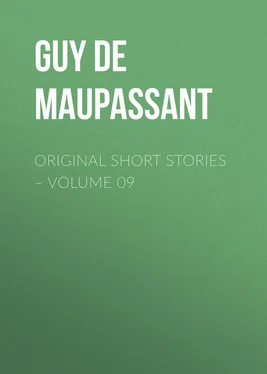Guy Maupassant - Original Short Stories – Volume 09
Здесь есть возможность читать онлайн «Guy Maupassant - Original Short Stories – Volume 09» — ознакомительный отрывок электронной книги совершенно бесплатно, а после прочтения отрывка купить полную версию. В некоторых случаях можно слушать аудио, скачать через торрент в формате fb2 и присутствует краткое содержание. Жанр: literature_19, foreign_antique, foreign_prose, на английском языке. Описание произведения, (предисловие) а так же отзывы посетителей доступны на портале библиотеки ЛибКат.
- Название:Original Short Stories – Volume 09
- Автор:
- Жанр:
- Год:неизвестен
- ISBN:нет данных
- Рейтинг книги:5 / 5. Голосов: 1
-
Избранное:Добавить в избранное
- Отзывы:
-
Ваша оценка:
- 100
- 1
- 2
- 3
- 4
- 5
Original Short Stories – Volume 09: краткое содержание, описание и аннотация
Предлагаем к чтению аннотацию, описание, краткое содержание или предисловие (зависит от того, что написал сам автор книги «Original Short Stories – Volume 09»). Если вы не нашли необходимую информацию о книге — напишите в комментариях, мы постараемся отыскать её.
Original Short Stories – Volume 09 — читать онлайн ознакомительный отрывок
Ниже представлен текст книги, разбитый по страницам. Система сохранения места последней прочитанной страницы, позволяет с удобством читать онлайн бесплатно книгу «Original Short Stories – Volume 09», без необходимости каждый раз заново искать на чём Вы остановились. Поставьте закладку, и сможете в любой момент перейти на страницу, на которой закончили чтение.
Интервал:
Закладка:
On the fifth day he ventured into the Rue Dauphine, Curious glances followed him and he walked along with a furtive expression in his eyes and his head bent down. As he got outside the town towards the valley they lost sight of him; but two hours later he returned laughing and rolling against the walls. He was drunk, absolutely drunk.
Nothing could cure him.
Driven from home by his mother, he became a wagon driver, and drove the charcoal wagons for the Pougrisel firm, which is still in existence.
His reputation as a drunkard became so well known and spread so far that even at Evreux they talked of Mme. Husson’s “Rosier,” and the sots of the countryside have been given that nickname.
A good deed is never lost.
Dr. Marambot rubbed his hands as he finished his story. I asked:
“Did you know the ‘Rosier’?”
“Yes. I had the honor of closing his eyes.”
“What did he die of?”
“An attack of delirium tremens, of course.”
We had arrived at the old citadel, a pile of ruined walls dominated by the enormous tower of St. Thomas of Canterbury and the one called the Prisoner’s Tower.
Marambot told me the story of this prisoner, who, with the aid of a nail, covered the walls of his dungeon with sculptures, tracing the reflections of the sun as it glanced through the narrow slit of a loophole.
I also learned that Clothaire II had given the patrimony of Gisors to his cousin, Saint Romain, bishop of Rouen; that Gisors ceased to be the capital of the whole of Vexin after the treaty of Saint-Clair-sur-Epte; that the town is the chief strategic centre of all that portion of France, and that in consequence of this advantage she was taken and retaken over and over again. At the command of William the Red, the eminent engineer, Robert de Bellesme, constructed there a powerful fortress that was attacked later by Louis le Gros, then by the Norman barons, was defended by Robert de Candos, was finally ceded to Louis le Gros by Geoffry Plantagenet, was retaken by the English in consequence of the treachery of the Knights-Templars, was contested by Philippe-Augustus and Richard the Lionhearted, was set on fire by Edward III of England, who could not take the castle, was again taken by the English in 1419, restored later to Charles VIII by Richard de Marbury, was taken by the Duke of Calabria occupied by the League, inhabited by Henry IV, etc., etc.
And Marambot, eager and almost eloquent, continued:
“What beggars, those English! And what sots, my boy; they are all ‘Rosiers,’ those hypocrites!”
Then, after a silence, stretching out his arm towards the tiny river that glistened in the meadows, he said:
“Did you know that Henry Monnier was one of the most untiring fishermen on the banks of the Epte?”
“No, I did not know it.”
“And Bouffe, my boy, Bouffe was a painter on glass.”
“You are joking!”
“No, indeed. How is it you do not know these things?”
THE ADOPTED SON
The two cottages stood beside each other at the foot of a hill near a little seashore resort. The two peasants labored hard on the unproductive soil to rear their little ones, and each family had four.
Before the adjoining doors a whole troop of urchins played and tumbled about from morning till night. The two eldest were six years old, and the youngest were about fifteen months; the marriages, and afterward the births, having taken place nearly simultaneously in both families.
The two mothers could hardly distinguish their own offspring among the lot, and as for the fathers, they were altogether at sea. The eight names danced in their heads; they were always getting them mixed up; and when they wished to call one child, the men often called three names before getting the right one.
The first of the two cottages, as you came up from the bathing beach, Rolleport, was occupied by the Tuvaches, who had three girls and one boy; the other house sheltered the Vallins, who had one girl and three boys.
They all subsisted frugally on soup, potatoes and fresh air. At seven o’clock in the morning, then at noon, then at six o’clock in the evening, the housewives got their broods together to give them their food, as the gooseherds collect their charges. The children were seated, according to age, before the wooden table, varnished by fifty years of use; the mouths of the youngest hardly reaching the level of the table. Before them was placed a bowl filled with bread, soaked in the water in which the potatoes had been boiled, half a cabbage and three onions; and the whole line ate until their hunger was appeased. The mother herself fed the smallest.
A small pot roast on Sunday was a feast for all; and the father on this day sat longer over the meal, repeating: “I wish we could have this every day.”
One afternoon, in the month of August, a phaeton stopped suddenly in front of the cottages, and a young woman, who was driving the horses, said to the gentleman sitting at her side:
“Oh, look at all those children, Henri! How pretty they are, tumbling about in the dust, like that!”
The man did not answer, accustomed to these outbursts of admiration, which were a pain and almost a reproach to him. The young woman continued:
“I must hug them! Oh, how I should like to have one of them – that one there – the little tiny one!”
Springing down from the carriage, she ran toward the children, took one of the two youngest – a Tuvache child – and lifting it up in her arms, she kissed him passionately on his dirty cheeks, on his tousled hair daubed with earth, and on his little hands, with which he fought vigorously, to get away from the caresses which displeased him.
Then she got into the carriage again, and drove off at a lively trot. But she returned the following week, and seating herself on the ground, took the youngster in her arms, stuffed him with cakes; gave candies to all the others, and played with them like a young girl, while the husband waited patiently in the carriage.
She returned again; made the acquaintance of the parents, and reappeared every day with her pockets full of dainties and pennies.
Her name was Madame Henri d’Hubieres.
One morning, on arriving, her husband alighted with her, and without stopping to talk to the children, who now knew her well, she entered the farmer’s cottage.
They were busy chopping wood for the fire. They rose to their feet in surprise, brought forward chairs, and waited expectantly.
Then the woman, in a broken, trembling voice, began:
“My good people, I have come to see you, because I should like – I should like to take – your little boy with me – ”
The country people, too bewildered to think, did not answer.
She recovered her breath, and continued: “We are alone, my husband and I. We would keep it. Are you willing?”
The peasant woman began to understand. She asked:
“You want to take Charlot from us? Oh, no, indeed!”
Then M. d’Hubieres intervened:
“My wife has not made her meaning clear. We wish to adopt him, but he will come back to see you. If he turns out well, as there is every reason to expect, he will be our heir. If we, perchance, should have children, he will share equally with them; but if he should not reward our care, we should give him, when he comes of age, a sum of twenty thousand francs, which shall be deposited immediately in his name, with a lawyer. As we have thought also of you, we should pay you, until your death, a pension of one hundred francs a month. Do you understand me?”
The woman had arisen, furious.
“You want me to sell you Charlot? Oh, no, that’s not the sort of thing to ask of a mother! Oh, no! That would be an abomination!”
The man, grave and deliberate, said nothing; but approved of what his wife said by a continued nodding of his head.
Читать дальшеИнтервал:
Закладка:
Похожие книги на «Original Short Stories – Volume 09»
Представляем Вашему вниманию похожие книги на «Original Short Stories – Volume 09» списком для выбора. Мы отобрали схожую по названию и смыслу литературу в надежде предоставить читателям больше вариантов отыскать новые, интересные, ещё непрочитанные произведения.
Обсуждение, отзывы о книге «Original Short Stories – Volume 09» и просто собственные мнения читателей. Оставьте ваши комментарии, напишите, что Вы думаете о произведении, его смысле или главных героях. Укажите что конкретно понравилось, а что нет, и почему Вы так считаете.












